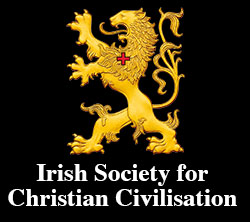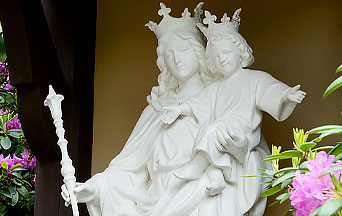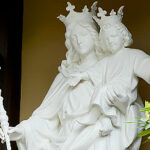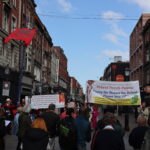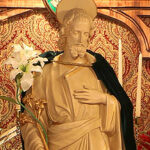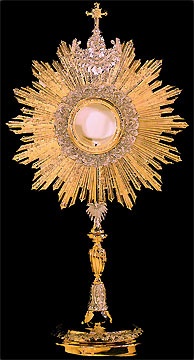
At first glance, the tiny Austrian village of Seefeld, today home to little more than 3,000 people, would hardly seem to be the site of a spectacular Eucharistic miracle over 600 years ago.
On March 25, 1384, which was simultaneously Holy Thursday and the Feast of the Annunciation, the knight Oswald Müsler attended Holy Mass in the parish church of St. Oswald in Seefeld.
The Eucharistic Miracle Happened on Holy Thursday in 1384
Müsler was infamous for unjustly imprisoning those traveling through his lands and extorting money from them. Those who could not pay would be left to rot away and die in his prison. When this fearsome knight and his men arrived on Holy Thursday, the local priest dared not refuse his demand for an especially large host, typically reserved for priests.
The Blood Host and the Knight Oswald Müsler
Instead of kneeling, Müsler demanded the large Host be given to him while standing. However, as he received communion, the huge, formidable knight immediately sank to his knees as the stone floor beneath his feet gave way like quicksand! While falling, he desperately attempted to grasp the nearby altar for support, only to find that the hard stone altar melted through his fingers like a knife through hot butter. Utterly helpless, the knight cried out in desperation to God for mercy. Like Goliath, this proud giant was humbled by Our Lord. He then begged the same priest whom he had previously threatened to remove the Host he had unworthily received from his mouth.
As soon as the priest had removed the Host, the ground suddenly became stable, and the knight regained his footing. Many in the church observed how the Host had turned bright red, dripping with blood! Deeply humbled by this clear rebuke from Our Lord, the knight immediately entered the nearby monastery in Stams (Tyrol), where he did two years of severe penance for his sins before dying a natural death.
News of the miracle spread rapidly throughout the realm, and soon a hostel was built to house the many visiting pilgrims. The knight Parzifal von Weineck donated the gilded monstrance, which still contains the miraculous Host today. Realizing the church building was too small, Duke Friedrich IV of Austria commissioned a new church to be built. The location was the favorite pilgrimage site of Holy Roman Emperor Maximilian I and Archduke Ferdinand II of Austria, who commissioned the special chapel (called the “Heiligenblutkappelle”) to house the bloodstained Host. Thus, St. Oswald’s Church in Seefeld remains one of Austria’s most popular pilgrimage destinations. The marks left by the knight on the altar and the floor can still be seen there today.
Give Honour and Glory to God
The tale of this proud knight being humbled on the occasion of Holy Thursday should serve to remind us of how we should view this Lenten season. Our Lord chose to manifest his displeasure and chastise Müsler on the double feast of Holy Thursday and the Annunciation for a reason. On Holy Thursday, we remember Our Lord’s emphasis on the importance of humility by His washing of His disciples’ feet. On the feast of the Annunciation, we also commemorate the Blessed Virgin’s tremendous humility, docility and submission to the will of God as she declared, “Ecce Ancilla Domini, fiat mihi secundum verbum tuum” (Behold the handmaid of the Lord, be it done to me according to thy word). Therefore, we must seek to imitate this humility since, as Saint Augustine argued, it is the foundation of all virtues. The contrary vice of pride is the root of all sin. In so doing, we will give honor and glory to God.
Furthermore, the acquiescence of the Seefeld parish priest to Oswald Müsler’s request for the Eucharist must not be repeated by the clergy of our time. Priests must learn from Our Lord’s rebuke to Müsler, who so callously abused his power by unjustly imprisoning and starving traveling merchants to death. They must not be intimidated by those today who abuse their power and disregard the intrinsic value of human life. Today, politicians and world leaders wield far greater power than knights and nobles of old. One might ask if they openly abuse their power like Müsler to harm the weak?
The Inalienable Right to Life
The Catechism of the Catholic Church provides the answer. It states that the “inalienable right to life of every innocent human individual is a constitutive element of a civil society and its legislation” (CCC: 2273). However, many politicians abuse their power by voting for pro-abortion legislation. Is this not a violation of God’s law by depriving unborn babies of their “inalienable right to life?”
Describing violations of the Fifth Commandment, the Catechism unequivocally states that “formal cooperation in an abortion constitutes a grave offense” (CCC: 2272) while Canon Law 1398 declares that “a person who procures a completed abortion incurs a latae sententiae excommunication.” Thus, politicians who knowingly facilitate the murder of the unborn may therefore be at risk of ipso facto excommunication, even if the excommunication is not declared publicly. Several of these politicians who publicly, knowingly and persistently support this excommunicable offense against God’s law still attempt to receive Holy Communion.
Such politicians are expressly forbidden to do so under Canon Law 915 “those who have been excommunicated or interdicted after the imposition or declaration of the penalty and others obstinately persevering in manifest grave sin are not to be admitted to Holy Communion.”
But I Call You to Account for His Blood (EZ 33:8)
However, can Christians judge the sins of another like this? While only God can look into our hearts, the faithful are indeed called to correct others from their manifest public sins: “if thou dost not speak to warn the wicked man from his way: that wicked man shall die in his iniquity, but I will require his blood at thy hand” (Ezekiel 33:8). Denying pro-abortion politicians Communion would thereby demonstrate their need to repent like Müsler, while also complying with official Church teachings surrounding the necessary preconditions for worthy reception of the Blessed Sacrament.
Several bishops have emphasized that it scandalizes the faithful when politicians who publicly and persistently violate the official moral teaching of the Church are treated by the clergy as though they were in a state of grace. The Catechism also explains how such scandals can easily lead others into sin. Such behavior suggests to the faithful that repentance from grave sins such as procured abortion is apparently unnecessary (CCC: 2284). The clergy, therefore, have the pastoral duty to refuse such people Holy Communion to draw attention to the evil being done to innocent life, the “constitutive element” of Christian civilization (CCC: 2273).
“So Whoever Eats the Bread or Drinks the cup of the Lord Unworthily is Guilty of the Body and Blood of the Lord”
Remembering the story of Oswald Müsler, we must not let ourselves be intimidated by those who unjustly abuse their power to harm the weak. Müsler’s formidable worldly strength was utterly useless in the end when Our Lord intervened. The clergy should learn from the story of this miracle to resist the Müslers of our time, not least of all for the good of their own souls. Saint Paul’s warning must never be forgotten: “Therefore whosoever shall eat this bread, or drink the chalice of the Lord unworthily, shall be guilty of the body and of the blood of the Lord” (1 Corinthians 11:27).
Our Lord sees inside our souls and knows all our secrets. Therefore, it is of paramount importance that we are in a state of grace each time we receive Holy Communion, rather than attempting to satisfy prideful desires to appear outwardly pious while living a life in grave sin. This is the lesson of Oswald Müsler.
This year, it is more crucial than ever that we turn to prayer and intercession to increase devotion to Our Lady across our country. That’s why you’re invited to join us in the Three Hail Marys Pledge, a powerful devotion that can bring personal spiritual benefits and national transformation. By reciting three Hail Marys daily, you honour the Immaculate Heart of Mary and seek her intercession for the conversion of sinners, the salvation of souls and the restoration of Ireland’s Catholic Faith. This ancient devotion, revealed to Saint Mechtilde, promises spiritual benefits including protection from mortal sin and the assurance of a good death. Your daily prayers will contribute to an increase in devotion to Our Lady, the conversion of sinners and the moral renewal of our country. Let us commit to this powerful devotion and seek the guidance and protection of Our Lady.


